Delaware Cottage Food Laws allows individuals to make homemade products that are neither potentially hazardous nor Time or Temperature Control for Safety (TCS) Foods, and offer them for sale.
Table of Contents
HOW TO START YOUR COTTAGE FOOD BUSINESS IN DELAWARE – LICENSING
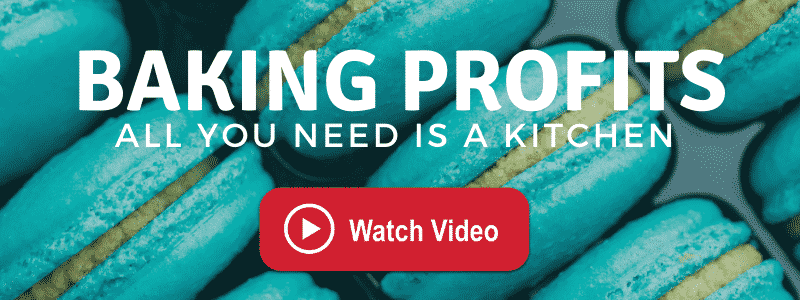
Delaware is fairly new in its creation of cottage food laws. Unfortunately at this time all their information exists buried into the legalese that is the state’s law.
You can read through that here:
Delaware Cottage Food Establishment Laws – they do have a checklist available which may feel a bit overwhelming but remember… call and get help, your taxes pay their salaries – they work for us.
Delaware Cottage Food Checklist
Have questions before applying: (302) 744-4546
You can also contact your local Health Department
Checklist preview:
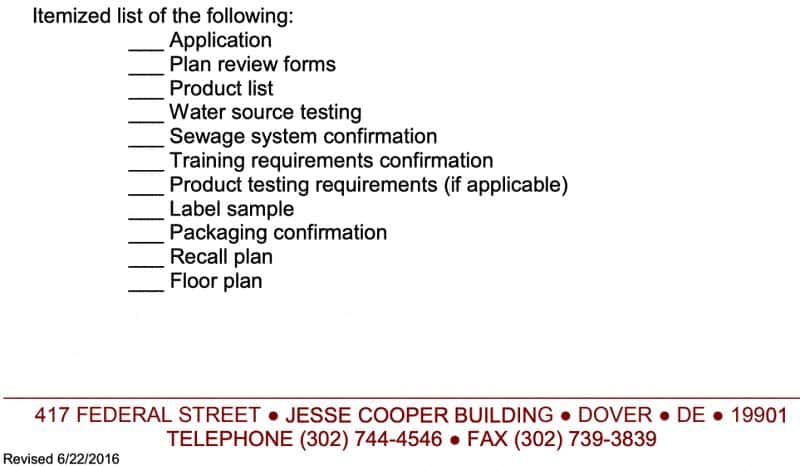
- If you have a private water supply (well), the water supply must be tested prior to receiving a license in order to demonstrate that the water supply is safe to drink. Subsequent testing may be required. This can be done by contacting your local health department office in your county.
- You must complete a food safety training program that includes training in food processing and packaging. These online food safety courses can be completed quickly. A list of approved training option including online training can be found here.
- You must apply for a license (Registration to Operate a Cottage Food Establishment) and pay the application fee of $30.00. You can apply here.
- Delaware limits annual sales from a cottage food operator to $25,000.
Always contact your local city / county office and verify if a business license is required prior to starting.
DELAWARE COTTAGE FOOD LAWS – Foods That Are Allowed
The following list are examples of acceptable cottage foods:
- Loaf breads, rolls and biscuits
- Sweet breads, bakery type desert breads, muffins, cookies
- Non-potentially hazardous cakes including celebration cakes (e.g. birthday cake, but not cheese cake)
- Non-potentially hazardous pastries and cookies
- Candies and confections
- Fruit pies (not pumpkin)
- Jams, jellies and preserves (must meet the Standard of Identity in 21CFR150)
- Dried fruits
- Dry herbs, seasonings and mixtures
- Non-potentially hazardous cereals, trail mixes and granola
- Coated or uncoated nuts
- Vinegar and flavored vinegars
- Popcorn and popcorn balls
- Cotton Candy
PLEASE NOTE: This list is not inclusive. Products on this list are not automatically approved, and the list above is subject to change.
See contact information below to double check your planned foods before starting. Include any items you will consider preparing on the application to insure approval.
Real Life Cottage Food Entrepreneurs and Opportunities
- Cakes – teacher turns kitchen into bakery
- Doughnuts – cottage mini donut vendor
- Fruit jams and jellies – See Additional Requirements Here
- Kettle corn – real kettle corn vendors from home
- Popcorn (plain and flavored) – see a real home vendor here
- Talk and Join hundreds of others here: VendorsUnited.com
HOW MUCH ARE YOU ALLOWED TO MAKE WITH COTTAGE FOODS?
Delaware limits cottage food establishments to no more than $25,000 annual income. This is to encourage opening your own commercial retail establishment.
Colorado created a brochure on going beyond cottage food once you’ve outgrown or hit your maximum allowed income. Although this is Delaware, this may help you make a plan to grow too!
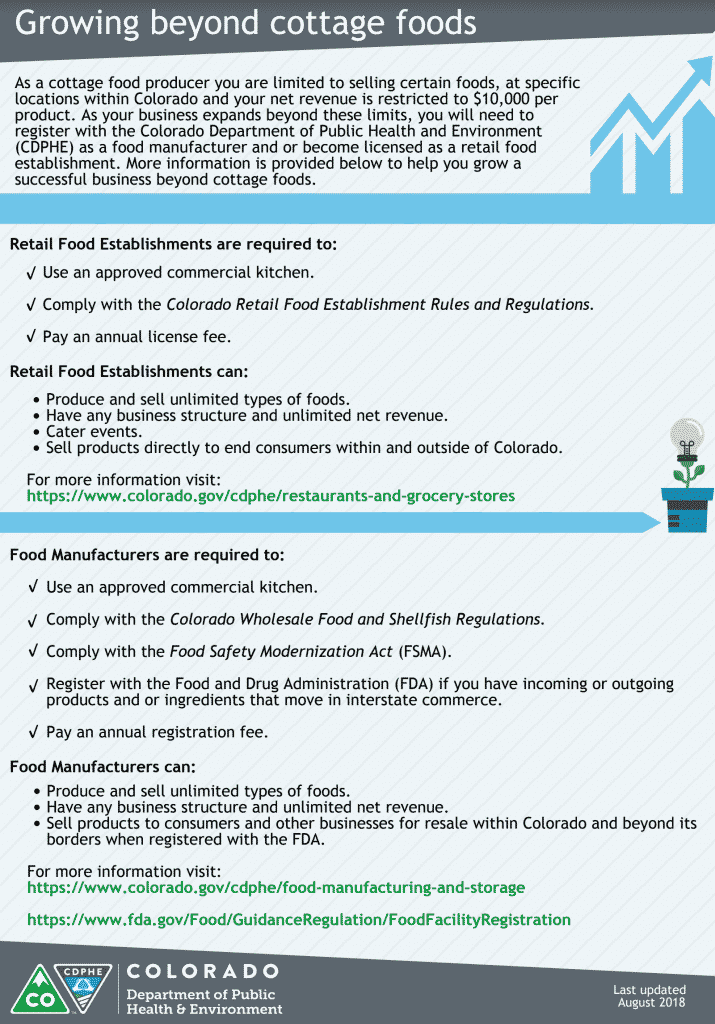
DELAWARE COTTAGE FOOD LAWS – PROHIBITED FOODS
Delaware doesn’t maintain a list on the cottage food laws that are prohibited. Assume anything not on the above list as prohibited until you verify and get approval.
Most states prohibit any food that is potentially hazardous or requires refrigeration.
NOTE: Although eggs, milk and dairy products are not allowed, used as ingredients for the allowed foods – is acceptable.
Many prohibited foods that are baked or cooked into the allowed foods are rendered harmless and therefore allowed.
ACIDITY LEVELS AND TESTING
Most states determine if a food is non-potentially hazardous by the acidity level found in the food. The higher the acidity, the more stable at a range of temps, that food product is.
For example: milk is low acidity and requires temperature controls. Delaware can require testing if pH / acidity level is unknown.
The acidity of foods is measured by pH.
• The range of pH is commonly considered to extend from zero to 14. A pH value of 7 is neutral because pure water has a pH value of exactly 7. Values less than 7 are considered acidic, while those greater than 7 are considered basic or alkaline.
• All fruits are acidic foods and are usually tart and sour. Ex: tomato, lemon, peach, apple, etc.
• The FDA rule for acidic foods states that a food must have a pH below 4.6 to be sold as a minimally processed food.
• The reason for this is bacteria does not grow at this level of acidity.
• The exclusion shall not be construed as allowing the sale of low acid foods (pH > 4.6) in
hermetically sealed containers (i.e. home-canned green beans, peas, etc.) when such
food is not prepared in a permitted establishment.
TESTING
Some states require testing if the pH level is unknown. For many food products, the pH level is already known.
You can test for pH yourself using a pH spear tester. (make sure it is made for food and has a long spear tip).
Oklahoma State University shares an awesome guide for selecting the correct tester for foods and liquids which includes tips and tricks for operation and maintenance. Get The Guide Here.
DELAWARE COTTAGE FOOD LAWS LABELING REQUIREMENTS
Most states require labeling on any product produced at a home kitchen. However, even if your state doesn’t require labeling, this is your chance to stand out and show you care.
Delaware cottage food laws require labeling on all products made under the cottage food law.
8.2 Labeling
8.2.1 Products shall be properly labeled with the following: Name of CFE, name of product, name, address, phone number and email of CFE, net weight or unit count, date of production / lot number.
8.2.2 Labels shall include a list of ingredients in decreasing order by weight. If the product label is too small to allow for printing of ingredients, the list shall be available at the request of the consumer.
8.2.3 Labels shall include the name of the food source for each major food allergen contained in the food unless the food source is already part of the common or usual name of the respective ingredient.
8.2.4 Labels shall include the following statement: “This food is made in a Cottage Food Establishment and is NOT subject to routine Government Food Safety Inspections”.
8.2.5 Labels shall be printed in at least 10-point type in a color that provides a clear contrast to the background label.
8.2.6 Additional information as required by the Division must be made available for review upon request from the consumer.
The code excerpts above can be found here.
Below is an example of what the state of Arizona requires on their labels.
Using VistaPrint.com or similar – you can quickly create professional labels that not only serve to meet the state cottage food guidelines but also serve for marketing your awesome business and products.
You’ll find some fantastic examples of this from members inside VendorsUnited.com
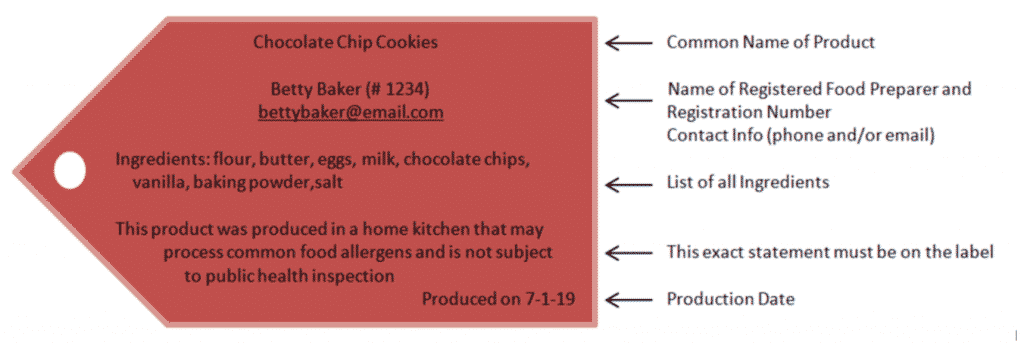
ALLERGENS ON LABELING
The FDA lists nine (9) major food allergens. Listing any of these on your label is a smart business practice and will certainly help your customers choose a product.
- Milk
- Eggs
- Fish (e.g., bass, flounder, cod)
- Crustacean shellfish (e.g., crab, lobster, shrimp)
- Tree nuts (e.g., almonds, walnuts, pecans)
- Peanuts
- Wheat
- Soybeans
- Sesame seeds
Simply add to your label: “NOTICE: SOYBEANS USED IN THIS RECIPE” Some go as far to announce that a certain allergen is used in the same kitchen.
Some states require you list any potential allergens and potential for any cross contamination even if the allergen is not used in the recipe.
FDA Allergen Labeling Example: Contains Wheat, Milk, Egg, and Soy
WHERE CAN I SELL MY COTTAGE FOOD PRODUCTS
Delaware Cottage Food Laws restrict cottage food sales from you to the end user only. They can not be wholesaled for re-sale.
ONLINE SALES ALLOWED
You may advertise and take orders for your product online, but you must directly deliver such products to consumers and you may only deliver products within the State of Delaware.
Sales and product delivery must be directly from the producer or designee to the consumer, in a person-to-person transaction.
“Direct Sales” means sales by the cottage food establishment that moves the products only within the State of Delaware directly to the consumer without the use of an independent retailer or other intermediary.
Inside kitchenincome.com you can find out how many cottage food entrepreneurs are getting sales faster than they can make the food.
FOOD HANDLER TRAINING AND BEST PRACTICES
DELAWARE APPROVED FOOD HANDLER COURSES / TRAINING
- You must complete a food safety training program that includes training in food processing and packaging. These online food safety courses can be completed quickly. A list of approved training option including online training can be found here.
SAFE PRACTICES
Much of this may seem like common sense, but even if you already know, it’s a good idea to remind yourself with a list of things that can prevent you from missing something small.
And if for no other reason… CYA! CYA = Cover Your A#%
CLEAN WORK AREA / WORK SPACE / SANITIZATION
Providing safe to eat foods from your kitchen – starts in your kitchen.
Keep your area clean and sanitized to avoid cross contamination and to insure you provide your customers and clients with the safest and best foods they can get.
The following are some “common” sense things you can do to insure the best environment for preparing foods to sell:
- Keep all equipment and surface areas clean and sanitized
- Make sure window and door screens are bug proof with no gaps
- Keep ingredients separate to prevent cross contamination / e.g. raw eggs near flour
- No pets in work area and preferably none in the home
- Allow no-one with a cold, sniffles or sick in kitchen while preparing foods
- Wipe down walls and clean floors daily
- Use good lighting to avoid missing unclean areas
- Keep window and door screens in good repair to keep insects out
- Wash hands frequently while working and use food grade gloves for extra safety
- Keep areas of food storage and equipment storage clean and sanitized
RECORD KEEPING
Why keep these types of records?
Let’s say the inspector calls you and says they got a report that your banana bread, someone purchased, made them sick.
You’ll be able to show that you didn’t even make banana bread that week and that the person who reported you, bought that 4 weeks ago and you weren’t even the one that sold it to him.
This does not need to be complicated. I love my yellow legal pads and they make an inexpensive tool for keeping up with the following:
- The recipes you use including ingredients
- The process you use to prepare that specific recipe: (can be just like recipe instructions)
- Date made (can be coded for your own use only if your state doesn’t require the production date) e.g. Made 12.22.29 = 292212
- Date sold (you can have a batch code to help track a certain batch) Simply write down date you sold an item
- Location sold is another great piece of information to keep track of
- Sales receipts are something great to keep for a couple of reasons and over at KitchenIncome.com I dive into the best practices, best systems and best methods for tracking, managing, selling and shipping.
COTTAGE FOOD lIABILITY INSURANCE
We live in a society that likes to sue. I can sue you for wearing that color shirt. No kidding!
Of course I probably won’t win, but at the very least, it’s gonna cause you stress and some costs.
Liability insurance is a MUST.
It can be expensive – but several years ago, I found FLIP and by far, they gave me the most protection (coverage) and allow you to run your cottage food business without fear of being sued.
WHY? Because they provide the lawyers. And their lawyers… they are good!
Of course you should price shop around with your local agent or a national brand company, but rest assured, I’ve done all the legwork for you.
Alternatively, some folks opt to get bonded. You’ve heard the saying before: “licensed and bonded”. A bond is usually provided from an insurance bonding company or your own insurance company.
My first time, I got a bond at State Farm.
A bond is expensive comparatively but is less out of pocket in the beginning. Of course, it’s way, way less insurance / coverage too.
A $10,000 bond may cost $50 annually while a $2,000,000.00 liability policy may cost a few hundred a year.
No matter what you decide… knowing you’re insured against frivolous lawsuits is worth every penny.
DELAWARE COTTAGE FOOD LAWS IMPORTANT LINKS
- Delaware Cottage Food Regulations with Definitions
- University of Delaware Cottage Food Entrepreneur Training
- Delaware Cottage Food Establishment Checklist
- ServSafe Food Handler / Food Manager Training for Delaware
- Delaware Cottage Food Establishment Application
- Cottage Food Training List of Approved Training Programs
- Manual Warewashing / Hand Washed Equipment / Utensil Requirements in Delaware
- Delaware Hand Washing Requirements – Food Safety
TAXES
Contact Delaware Department of Revenue for requirements on collecting sales tax and business licensing: (302) 577-8778
CONTACT DELAWARE’S OFFICE OF FOOD PROTECTION – COTTAGE FOOD
DELAWARE OFFICE OF FOOD PROTECTION – SITE
417 Federal Street
Dover, DE 19901
SEC: (302) 744-4556
DPH: (302) 744-4700
UPDATES TO DELAWARE COTTAGE FOOD LAWS
From time to time, links, info, rules and numbers change, are updated or made obsolete.
Although I spend time daily with hundreds of vendors (many of which are cottage food businesses) – I can miss an update.
If you find a broken link or outdated state information… please let me know and I’ll send you a special thank you for helping me maintain the best site on the internet for the cottage food industry.
My goal has always been to have a central place that is absolutely free for those starting out or existing entrepreneurs who use their homes and kitchens to make real incomes.
Please send to [email protected] / or post inside the private VendorsUnited.com group.
Need more resources? Check it out HERE (Helpful Resources)
Take a peek at the best vendors on the planet, the community that rocks the food vending world: Vendors United…
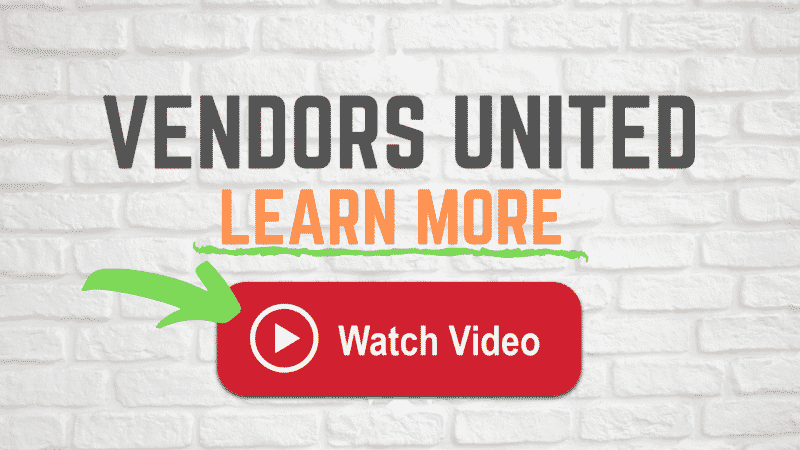
Disclaimer
This information is provided to help those interested in starting a cottage food business. It is not a document made by the state government. This information is not provided as law nor should be construed as law. Always use the contact information for each state to confirm compliance and any changes.
Did we help you? Help us to share this information…
 WATCH VIDEO!
WATCH VIDEO! WATCH VIDEO!
WATCH VIDEO!